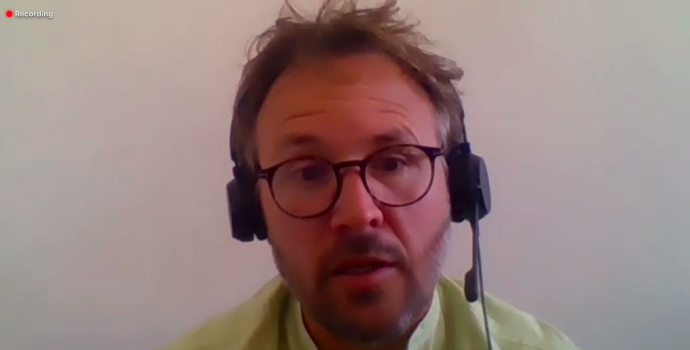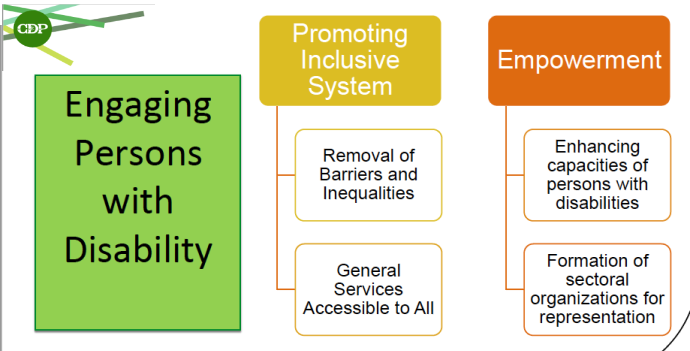- About Us
-
Who we are
-
- Publications
-
- ADPC Academy
-
MediaADPC'S NEWS
No one left behind: an inclusive approach to localization No one left behind: an inclusive approach to localization
8 Sep 2020
Bangkok, Thailand

Mr. Matthew Scott walks participants through the concept of inclusive approaches in disaster risk management and training curriculum.
The second virtual meeting of the Regional Technical Working Group on ‘Inclusive Approaches in Localization (RTWG-IAL)' took place on 3 September 2020. Participants from nine countries discussed the contours of a training curriculum for local organizations on rights-based and inclusive approaches to early warning, evacuation, and camp management.
Using local-level case studies and lessons, the training course is being co-developed by the member countries of the Asian Disaster Preparedness Center's (ADPC) Asian Preparedness Partnership (APP) ─ a multi-stakeholder platform of governments, the private sector and civil society ─ and Raoul Wallenberg Institute (RWI), Sweden.
The second meeting discussed the importance of inclusive approaches in early warning, evacuation, camp management, and pandemics including COVID-19 Response. It provided members with an opportunity to share case studies centered on inclusive approaches and their integration into the training curriculum.
Through a five-year project on “Building resilience through inclusive and climate adaptive disaster risk reduction in Asia-Pacific (BRDR)”, ADPC aims to integrate inclusive approaches in its different initiatives. APP is taking the lead on advancing localization of disaster preparedness and response and inclusivity in Cambodia, Myanmar, Nepal, Pakistan, the Philippines and Sri Lanka so that no one is left behind.
Mr. Matthew Scott, Senior Researcher, Team Leader, People on the Move thematic area from RWI facilitated the discussion on the development of the training course. He shared an insightful presentation that detailed the curriculum and how it can be further enriched using local examples.
He also responded to queries from participants and shared the principles of rights-based approaches in the context of disaster risk reduction.
Inclusive approaches in localization, specifically in disaster risk management (DRM) initiatives, are increasingly seen as an essential element of resilience. This is reflected in core international and regional frameworks for DRR. The inclusion of the most vulnerable segments of society in mainstream DRM initiatives and their implementation at the local level is crucial to sustainable development.
Ms. Loreine B. Dela Cruz, Executive Director, Center for Disaster Preparedness (CDP), presented a case study on “Inclusive and Rights-Based Approaches to Early Warning- Person with Disabilities”. The presentation expounded on the case studies that are being developed in the Philippines.
She emphasized on the concept of ‘Nothing about us without us’ which signifies that every humanitarian intervention should include the voice of differently able people.
Ms. Dela Cruz’s presentation highlighted challenges faced by differently able persons in a national context and emphasized on engaging and empowering them at the individual, family, and community level, and capitalize on their reflections and experiences. She explained how national policy, an enabling environment, and empowering persons with disabilities are all necessary steps towards inclusive solutions.
CDP is working to amplify the voices of persons with disabilities, ensure their representation, partnership, and collaboration in all planning processes, generating standardized modules for capacity development, and advance data collection for persons with disabilities.

Ms. Loreine B. Dela Cruz shares the current situation, challenges, and way forward to empower persons with disabilities.
The meeting was chaired by Mr. Fareed Ullah Khan, Chairperson, Participatory Rural Development Society (PRDS) representing Pakistan Resilience Partnership (PRP), with assistance from Mr. Sajid Naeem, Country Program Manager, ADPC Pakistan.
Mr. Khan and Mr. Sisira Madurapperuma, Director, Preparedness for Response and Recovery (PRR), ADPC gave the opening remarks.
Latest NewsRelated Trainings
-